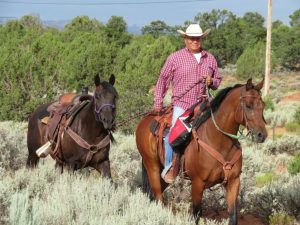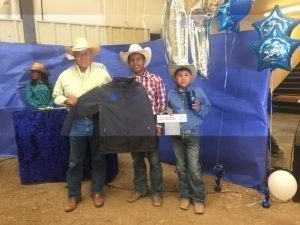The Navajo Nation consists of 27,000 square miles in the states of Arizona, New Mexico, and Utah with a population of 173,000 Navajos. Tuba City is located within the Painted Desert in Northeastern Arizona, approximately 50 miles from the eastern entrance to the Grand Canyon.
Activities
The Navajo Nation is the largest reservation in the country. It has only one incorporated township, and most homes do not have electricity, running water or telephones. A major portion of income comes from family-based agriculture. Although poverty is an issue, the Navajo people enjoy a rich cultural, spiritual and daily life based on small-scale farming and ranching.
The Western Navajo Agency’s priorities include the management of livestock and natural resources, youth development, healthy living, farming and home gardening. Extension plays a vital role in providing Navajo producers with information to expand their knowledge so that they can successfully engage in traditional farming practices. By growing traditional crops using proven methods, families can make a good living and utilize the food they produce for their own health and well-being. Although some families engage in small-scale sales through farmers markets and roadside stands, most of the produce is exchanged with other families rather than sold commercially for profit.
Highlights
MEASURING IMPACT
-
“I think [FRTEP programs have] a lot of impact. The older I’m getting, there’s a lot of youths that we started with when they were around nine. They’re in high schools now, so about 15, 16 years old, and you see them with horses and what they’re doing in their life, and they’re pointing towards [studying and working in] agriculture.”
FRTEP programs have had a major impact on individuals, families and tribal communities. Just how much impact has now been quantified thanks to a research project that used Ripple Effects Mapping (REM) and content analysis. The Indian Land Tenure Foundation (ILTF) engaged in a joint collaboration with an evaluation team and the Western Extension Risk Management Education Center to measure the long-term impacts of the Federally Recognized Tribal Extension Program (FRTEP) serving the community at Tuba City. Click the below the report.
Read the report
Youth Devlopment
Navajo Extension has developed a program to work with youth who do gymkhana and junior rodeo events. The University of Arizona brings in specialists in equine management, care and nutrition, as well as teachers who show kids how to ride and exercise their horses and take part in barrel racing. Thanks to a strong focus on skill development, youth programming has been one of the most successful endeavors for Western Navajo Extension.
Navajo Beef Program
Extension agents recruit, educate, and certify producers for the Navajo Beef program. Over 70 producers are certified annually thanks to training and education on Beef Quality Assurance (BQA) guidelines, record keeping, marketing and range management. Certifications continue to increase thanks to opportunities for high school students to be certified through FFA programs at school. The objective is to have students teach their parents who are ranchers about how to improve beef quality, the importance of vaccination, herd genetics and other best practices.
Bringing information to the community
Many Navajo elders are do not speak or understand English, so Extension presentations are often delivered in Navajo, translating cutting-edge information from the university to the grassroots level. Extension encourages traditional practices in all program areas and helps to promote crops such as blue corn, Indian corn and squash. Healthy byproducts, such as blue corn meal and ground kneel down bread (corn ground and baked under the earth), are instrumental for fighting the effects of diabetes. The Navajo Nation Special Diabetes Prevention Program works in partnership with FRTEP to build awareness and improve the health of community members.
COVID-19 Activities
- Provided personal protective equipment (PPE), latex gloves and thermometers for the community.
- Delivered face masks and hand sanitizer to the local strike team. Masks were provided by the Coconino County Extension, LaPaz County and the Page 4-H Club.
- Purchased 220 baskets of corn and watermelons for community members organized in conjunction with Future Farmers of America (FFA).

Contact Information
Grey Farrell – Extension Educator
Phone Number
928-614-5560
gfarrell@cals.arizona.edu
